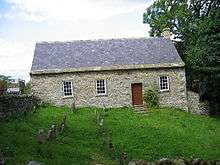Coanwood Friends Meeting House
| Coanwood Friends Meeting House | |
|---|---|
|
Coanwood Friends Meeting House from the south | |
| Location | Coanwood, Northumberland, England |
| Coordinates | 54°55′27″N 2°27′15″W / 54.9243°N 2.4541°WCoordinates: 54°55′27″N 2°27′15″W / 54.9243°N 2.4541°W |
| OS grid reference | NY 709 590 |
| Built | 1760 |
| Built for | Coanwood Quaker Meeting |
| Governing body | Historic Chapels Trust |
Listed Building – Grade II* | |
| Designated | 24 November 1967 |
| Reference no. | 1042914 |
 Location in Northumberland | |
Coanwood Friends Meeting House is a redundant Quaker meeting house under the care of the Historic Chapels Trust. It stands in an isolated, sparsely populated valley south of Hadrian's Wall, in East Coanwood, about 5 miles south of the town of Haltwhistle in Northumberland, England.[1] It is recorded in the National Heritage List for England as a designated Grade II* listed building.[2]
History
The Wigham family was an important family in Northumberland in the 17th and 18th centuries. In about 1734 Cuthbert Wigham joined the Society of Friends and founded a meeting of the Society in Coanwood. The meeting house was built in 1760 at a cost of £104 (equivalent to £14,180 in 2015),[3] on a plot of land given by Cuthbert Wigham. The meeting house is historically important because it has not been modified since then, other than the original heather-thatch roof being replaced by slates during the 19th century.[4] The building has been used in the past by the Coanwood Reading Society, and contained a library with books to loan.[4] Since coming under the care of the Historic Chapels Trust it has been repaired "in a manner that conserves its unique fabric and furnishings".[1]
Architecture
Coanwood Friends Meeting House is a single-storey building built on a plinth.[2] Its plan is rectangular, measuring 31.1 metres (102 ft) long by 6.2 metres (20 ft) wide.[4] It is constructed in squared stone in four bays with rusticated quoins and dressings. The roof has eaves of stone flags with slates above, and a stone ridge. There are fixed 12-pane windows in the two left (western) bays and in the bay on the right. Between them, in the third bay, are three steps leading up to a rectangular doorway. The lintel over the door is inscribed with the date 1760. The left and right sides are plain with gables and in the back wall is a 16-pane sash window. Attached to the right wall is a lean-to earth closet with a stone-slate roof.[2]
The interior is divided into two rooms by a partition containing top-hinged shutters to the right of the entrance. The larger room on the left has a stone-flagged floor, and contains simple wooden benches.[2] There is a central aisle with seven rows of open-backed benches facing to the west. Opposite these and facing them are two rows of benches on a dais; these are sometimes called elders' benches.[4] The benches form "a rare survival of the historic Quaker layout".[1] The smaller room contains a fireplace and a grate with an iron hob. The meeting house stands in a graveyard that contains "typical Quaker gravestones", many of which commemorate members of the Wigham family.[1]
Present day
The meeting house is in an area where there are many walkers' paths. It is normally left unlocked during daylight hours and open to visitors.[1] In September each year the Hexham Quaker Meeting holds a meeting for worship and a family picnic at the meeting house.[4]
See also
References
- 1 2 3 4 5 Coanwood Friends Meeting House, Historic Chapels Trust, retrieved 3 July 2010
- 1 2 3 4 Historic England, "Friends' Meeting House, Coanwood (1042914)", National Heritage List for England, retrieved 10 July 2013
- ↑ UK CPI inflation numbers based on data available from Gregory Clark (2016), "The Annual RPI and Average Earnings for Britain, 1209 to Present (New Series)" MeasuringWorth.
- 1 2 3 4 5 Coanwood Friends Meeting House, Hexham Quakers, retrieved 3 July 2010
